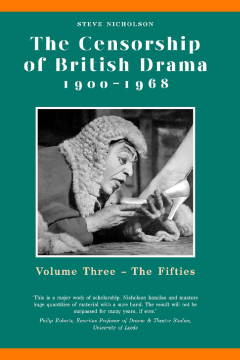
Additional Information
Book Details
Abstract
This is the third part of Steve Nicholson’s four-volume analysis of British theatre censorship from 1900 until 1968, based on previously undocumented material in the Lord Chamberlain’s Correspondence Archives in the British Library and the Royal Archives at Windsor.
Focusing on plays we know, plays we have forgotten, and plays which were silenced for ever, Censorship of British Drama demonstrates the extent to which censorship shaped the theatre voices of this decade.
The book charts the early struggles with Royal Court writers such as John Osborne and with Joan Littlewood and Theatre Workshop; the stand offs with Samuel Beckett and with leading American dramatists; the Lord Chamberlain’s determination to keep homosexuality off the stage, which turned him into a laughing stock when he was unable to prevent a private theatre club in London's West End from staging a series of American plays he had banned, including Arthur Miller's A View from the Bridge and Tennessee Williams's Cat on a Hot Tin Roof; and the Lord Chamberlain’s attempts to persuade the government to give him new powers and to rewrite the law.
Steve Nicholson is Professor of 20th-Century and Contemporary Theatre, and Director of Drama, in the School of English at the University of Sheffield. He is the series editor for Exeter Performance Studies and the author of British Theatre and the Red Peril: The Portrayal of Communism, 1917-1945, also published by UEP.
'. . . the book that I most eagerly awaited in 2011 . . . based like its predecessors on heroic research in the archives of the Lord Chamberlain's Department (the part of the Royal Household which controlled theatrical censorship until 1968).'
'Nicholson is a scholar who writes with lucidity, wit, humane intelligence and grace of mind. There is no jargon in his pages, but much glorious hilarity.'
'Nicholson's series ought to be mandatory reading for historians and biographers interested in twentieth-century England. [. . .] The quotations in this book are a gold mine for other writers.'(Richard Davenport-Hines, The Times Literary Supplement, December 2011)
‘Nicholson’s volumes are unique in their objective and especially their richness of research material. As such, his Censorship of British Drama represents an unsurpassed source of reference for theatre historians.’
‘…this new volume stands out in the realm of theatre history because it allows a precise understanding of the people behind the office, a human factor which completes Nicholson’s exhaustive investigation of the workings of the Lord Chamberlain’s practice of censorship'(Studies in Theatre and Performance, May 2013, Vol. 33, Issue 2)
‘…fascinating and revealing information about the day-to-day operation of this astonishingly long-lived institution.’
‘Nicholson’s impressively detailed analysis of these sources is an outstanding scholarly endeavour. Meticulous yet eminently readable, the collections offers a nuanced and detailed study of the system…’
‘…this extraordinary piece of scholarship.’ (Helen Freshwater,Theatre Notebook, 67.1, 2013, )
